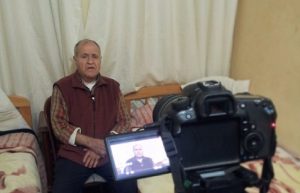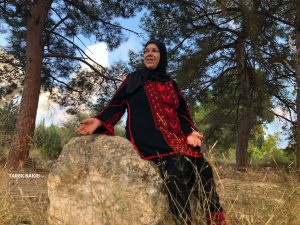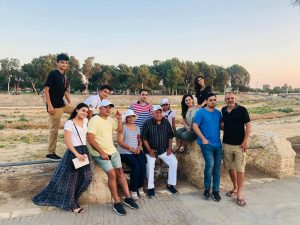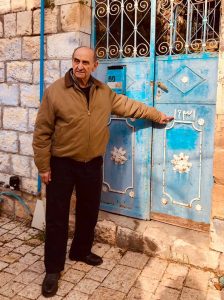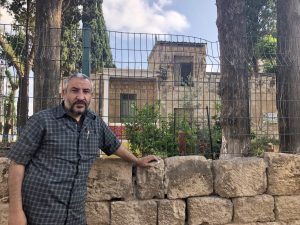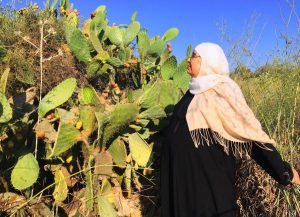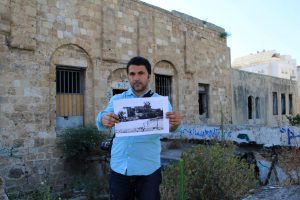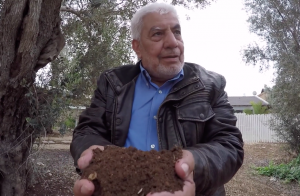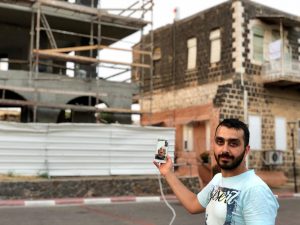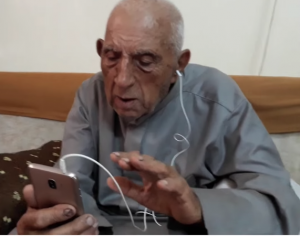ll of Tiberias lived on Hittin’s provisions of oil and wheat. I lived in a two-story house with a big garden, and it was ten minutes away from the mosque. I can’t wait to get back to it. Middle-ground solutions do not satisfy me… Hittin or the grave.”
Tawfiq Shabayta was born in 1919 in the village of Hittin, Tiberia Subdistrict. He died in Ein al-Hilweh Refugee Camp, Lebanon, in 2015.
“If they allowed you to return to Palestine, not to Al-Safsaf but rather Ramallah or Nablus, would you return?”
“Yes, I would… I would be a refugee there just as I am here, but not all exile is the same.”
Jamil Hamad was born in 1935 in Safsaf, Safad Subdistrict. He lives in Shatila Refugee Camp, Lebanon.
“My father was 19 years old at the time of Al-Nakba… he was part of the group of young men who remained to defend Al-Ghabisiyya before they were forcefully displaced. He was severely wounded, and for 52 years, he carried the six bullet fragments that settled in his head on the journey to exile at the refugee camp. He died a few years ago. Today I return with my six children to Al-Ghabisiyya carrying a foreign nationality. We sat on the ruins of our home as I recounted to them their grandfather’s stories.
Fadya al-Maqdah, Al-Ghabisiyya, Akka Subdistrict
“My family owned more than 20 stores in Bir al-Sabe’. My father had a shop that sold tools used by Bedouins. I was a boy during Al-Nakba, and as airplanes started to bombard the area, a few bombs landed next to our house. We escaped the shelling and walked towards the valley. We walked 50 kilometers in the desert. My elder brother died on the road. We reached Rafah and settled there for a few years until we headed to Egypt. We continued around the whole world until we reached Canada. Today, after all these years, three generations went back to Palestine – me, my children, and my grandchildren – to look for my home and recall my memories.”
Nabil Al Shurafa, Bir al-Sabe’
Gaza; Canada
“I was five years old when we were exiled from Safad. We walked to the Lebanese border and remained in Bint Jbeil for six months. We then continued on our way until we reached Al-Sham (Syria). I lived in Damascus, received my university degree from Spain, and found a job in America where I met my Mexican wife. A few months ago, the family decided to return to Palestine to try to find my home in Safad. We found the house after great effort and lots of searching. When the Israeli who stole our home saw us walking towards the house with cameras, he knew that he was living in the house I had been born in and simply stated: “I feel sorry about what happened to you. You look like a good person, and you are welcome to visit the house whenever you want. I do not want to talk about politics, but a war happened here, and we won. Should I be sorry that we won? It’s history, and this is how it was written, and this house is now mine.”
Husni Ghneim, Safad
Syria; United States of America
“I was born in Yarmouk Refugee Camp in 1961 and was raised to know the shape and detail of our house in Akka although I have never seen it. I pursued my university degree in America, later finding a job, getting American citizenship, and settling there. I decided to return to Palestine in 2018 to find our home. We walked among the houses of the new Akka neighborhoods outside the gate, and I was surprised when I intuitively found the house based on my father’s description: Twenty-four cypress trees surround the house, a red marking above the window. I found our house in Akka, and it is now a nursery that belongs to the Israeli Ministry of Education.”
Maher Chamma, Akka
Yarmouk Camp; United States of America
“Every time you see a cactus plant, you know that you are on the site of demolished homes. We used to plant cacti around our homes in the villages to determine areas and borders, but we never planted cacti on the Western side so that thorns would not fly with the western wind into our eyes.”
Ni’ma Shaqdeh was born in 1942 in Beit Nabala, Ramle Subdistrict. She now lives in Jordan.
The picture: Her return to her village for the first time after 68 years.
“Zionists always claim that the old will die and the young will forget… I am a third-generation descendent of Al-Nakba, and I traveled 13,000 kilometers from Australia to Palestine with an old picture of our home in Yafa … and I named my daughter Yafa.”
Ahmad al-Khalidi, Australia.
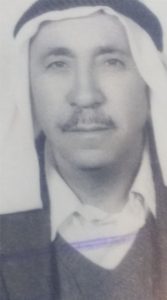 Ibrahim Tannous often recounted: “As we ran around the town – to the school, the mosque, or a neighbor’s house – doing a few errands, we would pick fruits off the trees and eat until we were full.”
Ibrahim Tannous often recounted: “As we ran around the town – to the school, the mosque, or a neighbor’s house – doing a few errands, we would pick fruits off the trees and eat until we were full.”
It took a very long time for the late Ibrahim Tannous to be convinced that he had become a refugee and that he would no longer be near the fruitful trees of Ein Karem. It took him many years to acclimate to the idea of buying fruit from the market in Amman instead of picking it from the trees of Ein Karem.”
Mohammad Ibrahim Tannous was born in Ein Karim, Jerusalem. He passed away in Amman a few years ago, never having been able to return to or visit Ein Karem.
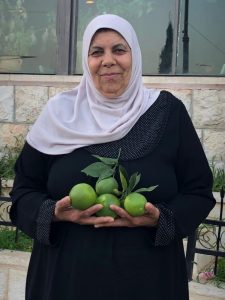 “I did the most beautiful thing in my life – after 68 years… I returned to Fajja, which is now an Israeli town under the jurisdiction of the city of Petah Tikva! I cannot believe that I returned to my village near Yafa and reclaimed two oranges from our home.”
“I did the most beautiful thing in my life – after 68 years… I returned to Fajja, which is now an Israeli town under the jurisdiction of the city of Petah Tikva! I cannot believe that I returned to my village near Yafa and reclaimed two oranges from our home.”
Hiyam Salah, Fajja, Yafa Subdistrict
Al-Kuwait
“As the saying goes: The wedding is in Saffuriyya, but the people of Al-Mujaydil are dancing. That is how my native village – Al-Mujaydil near Nazareth – was known. We used to love life, always joyful and happy. During Al-Nakba we were exiled to Syria, and I lived my life in Yarmouk Refugee Camp. After the war in Syria, Syrians and Palestinians alike sought refuge, but I became a refugee twice. I obtained foreign citizenship and returned to Al-Mujaydil to harvest its soul and pass it on to my children and grandchildren. I am not here to complain or cry over the land, I am here only to assert my rights.”
Hussein Ghubari, Al-Mujaydil, Nazareth Subdistrict
Yarmouk Refugee Camp; United States of America
Abdul Salam, the grandson of Yousef, returned to Palestine holding the foreign citizenship he obtained after he left Syria in 2013 because of the war. He spent two weeks at sea to reach Europe and was able to acquire Finnish citizenship. From Tiberias, Abdul Salam video-phoned his grandfather who was in Homs Refugee Camp.
Abdul Salam: Grandfather, I am now in Tiberias, and as you can see, according to what you have described to me, it seems that our home was demolished a few years ago, and a new building is being erected in its place.
Grandfather Yousef: It does not matter if the house was demolished my son… we want to return to Tiberias, and we will erect a tent on the shore.”
Yousef Al-Zobi, Homs Refugee Camp, Syria
Abdul Salam Al-Zobi, Finland
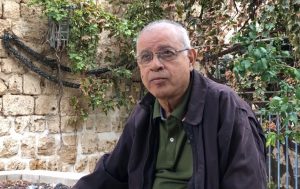 “I was born in Akka in 1943. Zionist gangs forced us out of our country. We walked towards southern Lebanon, and we stayed for a while in an old French army camp under inhumane conditions. Afterwards, we headed towards Beirut and settled in Bourj al-Barajneh Camp.
“I was born in Akka in 1943. Zionist gangs forced us out of our country. We walked towards southern Lebanon, and we stayed for a while in an old French army camp under inhumane conditions. Afterwards, we headed towards Beirut and settled in Bourj al-Barajneh Camp.
We were humiliated in Lebanon. My mother was shot in the stomach during the invasion, and after six hours of bleeding she was martyred. My brothers are martyrs, too. Some of them were killed during the Israeli invasion, and some during the Sabra and Shatila massacre. 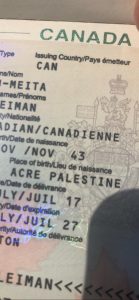
I went to Canada and obtained citizenship. When they asked me for my place of birth, I said Akka, and they replied, “So, Israel!” I said I was born in Akka, Palestine, when there was no such thing as Israel. Look at my Canadian passport: Place of Birth: Akka, Palestine, 1943.
Suleiman Abu Meita, Akka
Bourj al-Barajneh; Canada
All interviews were conducted as part of the visual-oral documentation project of Palestine, We Were and We Still Are Here. Stories and videos are published on Facebook: Tarek Bakri.



